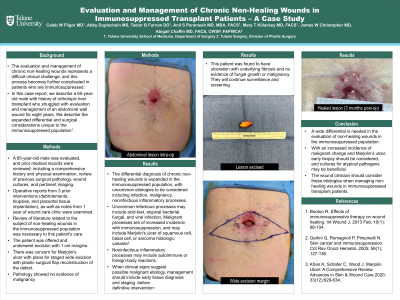Case Series/Study
(CS-059) Evaluation and management of chronic non-healing wounds in immunosuppressed transplant patients – a case study

Methods:
A 65-year-old male was evaluated and prior medical records were reviewed, including a comprehensive history and physical examination, review of previous surgical pathology, wound cultures, and pertinent imaging. Operative reports from 3 prior interventions (debridements, biopsies, and placental tissue implantation), as well as notes from 1 year of wound care clinic were examined. Review of literature related to the subject of non-healing wounds in the immunosuppressed population was necessary to this patient’s care. The patient was offered and underwent excision with 1 cm margins. Pathology at the time of abstract submission is pending. There is concern for Marjolin’s ulcer with plans for staged wide excision with plastic surgical flap reconstruction of the defect.
Results:
The differential diagnosis of chronic non-healing wounds is expanded in the immunosuppressed population, with uncommon etiologies to be considered including infection, malignancy, noninfectious inflammatory processes. Uncommon infectious processes may include acid-fast, atypical bacterial, fungal, and viral infection. Malignant processes are of increased incidence with immunosuppression, and may include Marjolin’s ulcer of squamous cell, basal cell, or sarcoma histologic variants2. Noninfectious inflammatory processes may include autoimmune or foreign-body reactions. When clinical signs suggest possible malignant etiology, management should include early tissue diagnosis and staging before definitive intervention3.
Discussion:
A wide differential is needed in the evaluation of non-healing wounds in the immunosuppressed population. With an increased incidence of malignant change and Marjolin’s ulcer, early biopsy should be considered, and cultures for atypical pathogens may be beneficial. The wound clinician should consider these etiologies when managing non-healing wounds in immunosuppressed transplant patients.
Trademarked Items:
References: 1 Bootun R. Effects of immunosuppressive therapy on wound healing. Int Wound J. 2013 Feb; 10(1):98-104.
2 Gerlini G, Romagnoli P, Pimpinelli N. Skin cancer and immunosuppression. Crit Rev Oncol Hematol. 2005; 56(1);127-136.
3 Khan K, Schafer C, Wood J. Marjolin Ulcer: A Comprehensive Review. Advances in Skin & Wound Care 2020; 33(12):629-634.

.png)